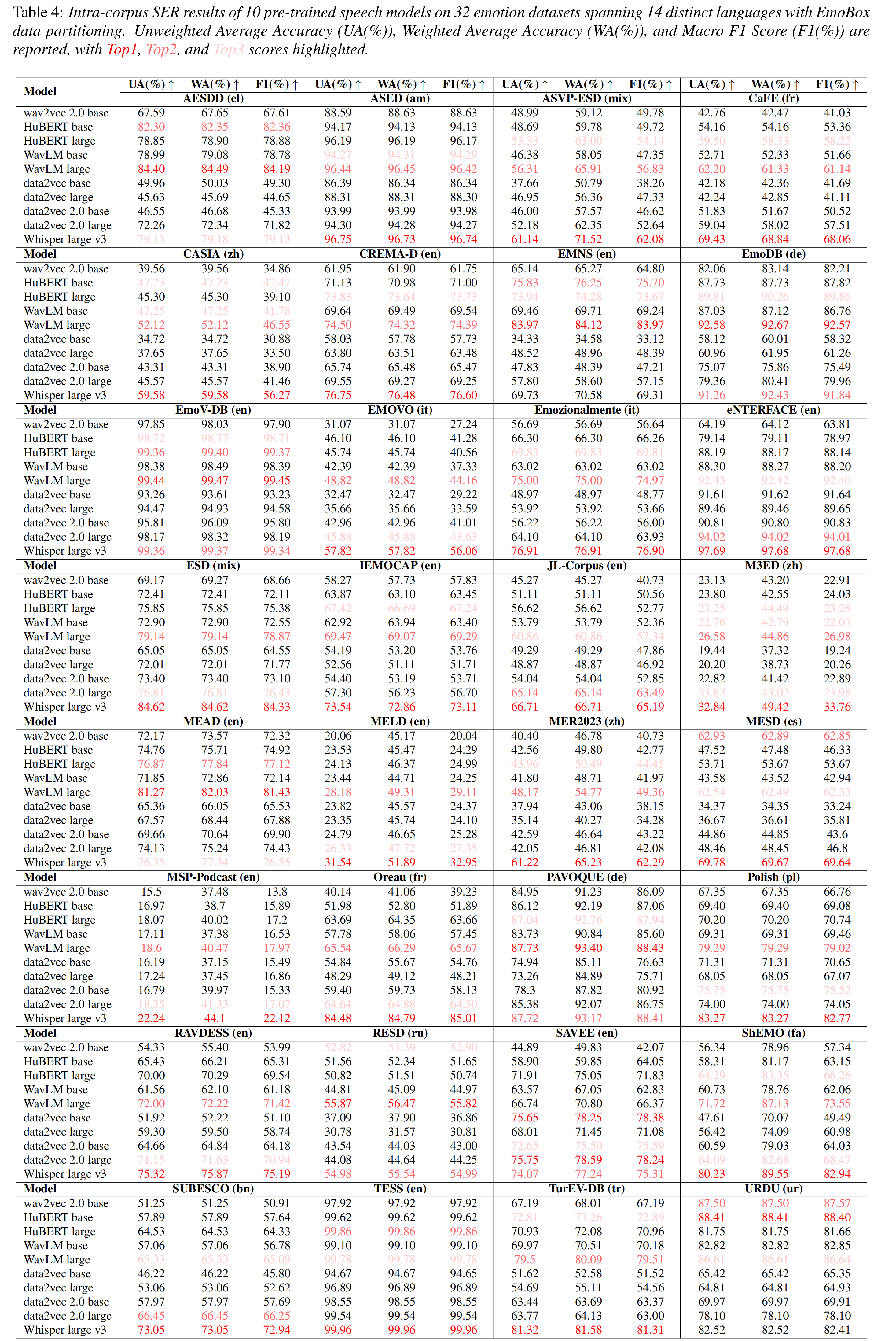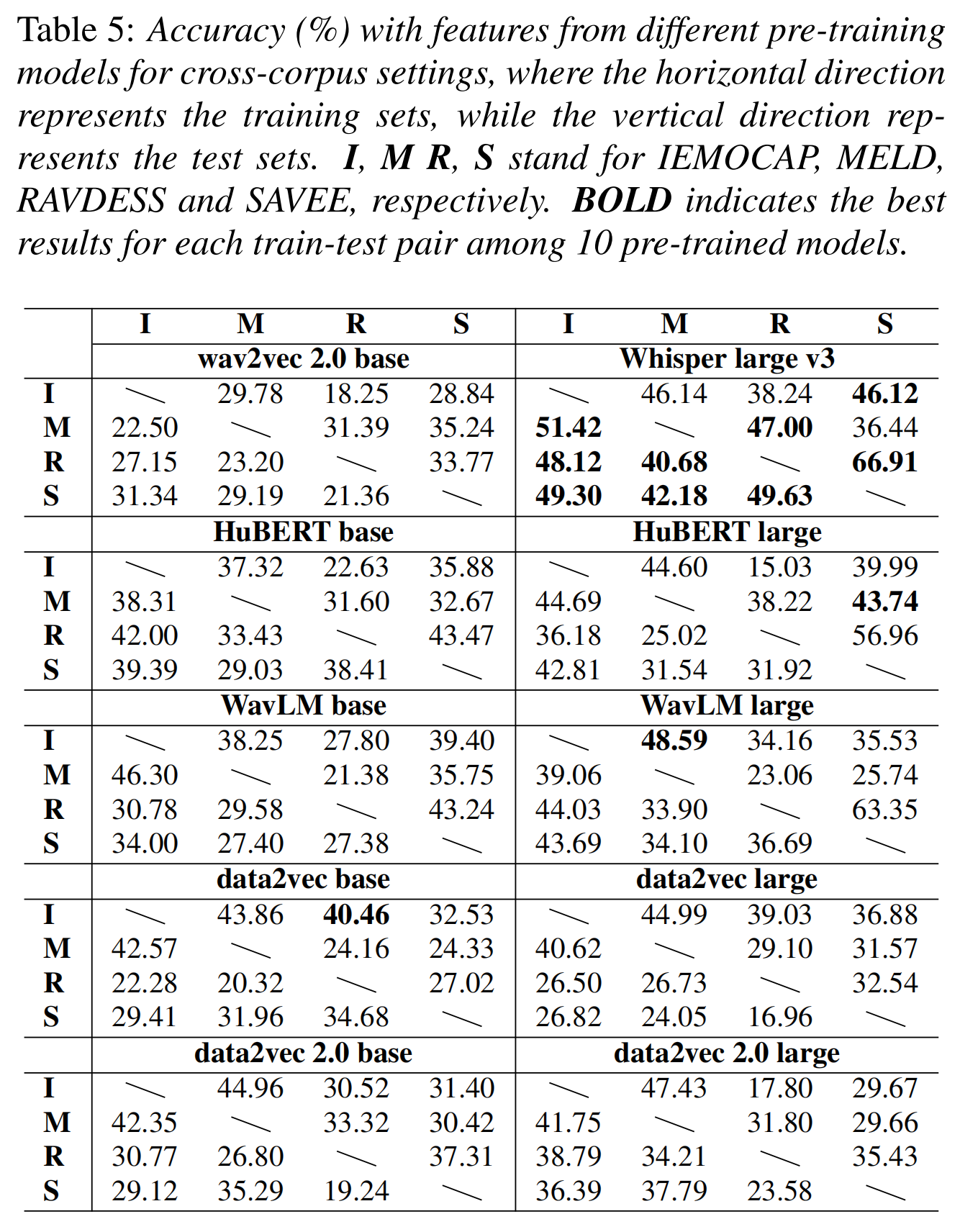This repository holds code, processed meta-data, and benchmark for
EmoBox: Multilingual Multi-corpus Speech Emotion Recognition Toolkit and Benchmark



EmoBox is an out-of-the-box multilingual multi-corpus speech emotion recognition toolkit, along with a benchmark for both intra-corpus and cross-corpus settings on mainstream pre-trained foundation models. We hope that our toolkit and benchmark can facilitate the research of SER in the community.
We include 32 speech emotion datasets spanning 14 distinct languages with download links, some of them require license or registration. We provide data preparation and partitioning of each datasets. Refer to the paper for more details.
| Dataset | Source | Lang | Emo | Spk | #Utts | #Hrs |
|---|---|---|---|---|---|---|
| AESDD | Act | Greek | 5 | 5 | 604 | 0.7 |
| ASED | Act | Amharic | 5 | 65 | 2474 | 2.1 |
| ASVP-ESD | Media | Mix | 12 | 131 | 13964 | 18.0 |
| CaFE | Act | French | 7 | 12 | 936 | 1.2 |
| CASIA | Act | Mandarin | 6 | 4 | 1200 | 0.6 |
| CREMA-D | Act | English | 6 | 91 | 7442 | 5.3 |
| EMNS | Act | English | 8 | 1 | 1181 | 1.9 |
| EmoDB | Act | German | 7 | 10 | 535 | 0.4 |
| EmoV-DB | Act | English | 5 | 4 | 6887 | 9.5 |
| EMOVO | Act | Italian | 7 | 6 | 588 | 0.5 |
| Emozionalmente | Act | Italian | 7 | 431 | 6902 | 6.3 |
| eNTERFACE | Act | English | 6 | 44 | 1263 | 1.1 |
| ESD | Act | Mix | 5 | 20 | 35000 | 29.1 |
| IEMOCAP | Act | English | 5 | 10 | 5531 | 7.0 |
| JL-Corpus | Act | English | 5 | 4 | 2400 | 1.4 |
| M3ED | TV | Mandarin | 7 | 626 | 24437 | 9.8 |
| MEAD | Act | English | 8 | 48 | 31729 | 37.3 |
| MELD | TV | English | 7 | 304 | 13706 | 12.1 |
| MER2023 | TV | Mandarin | 6 | / | 5030 | 5.9 |
| MESD | Act | Spanish | 6 | 11 | 862 | 0.2 |
| MSP-Podcast | Podcast | English | 8 | 1273 | 73042 | 113.6 |
| Oreau | Act | French | 7 | 32 | 434 | 0.3 |
| PAVOQUE | Act | German | 5 | 1 | 7334 | 12.2 |
| Polish | Act | Polish | 3 | 5 | 450 | 0.1 |
| RAVDESS | Act | English | 8 | 24 | 1440 | 1.5 |
| RESD | Act | Russian | 7 | 200 | 1396 | 2.3 |
| SAVEE | Act | English | 7 | 4 | 480 | 0.5 |
| ShEMO | Act | Persian | 6 | 87 | 2838 | 3.3 |
| SUBESCO | Act | Bangla | 7 | 20 | 7000 | 7.8 |
| TESS | Act | English | 7 | 2 | 2800 | 1.6 |
| TurEV-DB | Act | Turkish | 4 | 6 | 1735 | 0.5 |
| URDU | Talk show | Urdu | 4 | 29 | 400 | 0.3 |
| Total | -- | -- | -- | 3510 | 262020 | 294.4 |
Intra-corpus SER results of 10 pre-trained speech models on 32 emotion datasets spanning 14 distinct languages with EmoBox data partitioning. Refer to the intra-corpus benchmark and the paper for more details.
Cross-corpus SER results of 10 pre-trained speech models on 4 EmoBox fully balanced test sets. Refer to the cross-corpus benchmark and the paper for more details.
You need to download datasets and put them into downloads folder. Make sure paths to your downloaded audio files follow the audio paths in jsonl files in data/.
For example, you need to download the iemocap dataset into relative paths such as downloads/iemocap/Session1/sentences/wav/Ses01F_impro04/Ses01F_impro04_F000.wav, these audio files should follow the audio paths in data/iemocap/iemocap.jsonl
We prepare metadata files for each datasets, including several types of formats: json, jsonl, .... For example, the format of metadata in jsonl files is:
[ {
"key": "Ses01M_impro01_F000",
"dataset": "iemocap",
"wav": "downloads/iemocap/Session1/sentences/wav/Ses01M_impro01/Ses01M_impro01_F000.wav",
"type": "raw" # raw, feature
"sample_rate": 16000,
"length": 3.2,
"task": "category", # category, valence, arousal
"emo": "hap",
"channel": 1
}
,
...,
{...}
]
Some datasets (e.g. iemocap) require merging labels, so we provide a label_map.json file for this purpose.
EmoBox provides a torch dataset class EmoDataset and a evaluation class EmoEval. You may train your own models using any recipes or toolkits.
Using EmoDataset and EmoEval, it is easy to compare results from any model trained by any recipie or toolkit. Results can be submitted to our benchmark.
We provide an example pipeline code using EmoDataset and EmoEval:
from EmoBox import EmoDataset, EmoEval
dataset = "iemocap"
folds = 5 # different datasets have different number of folds, which can be find in data/
user_data_dir = "./" # path to EmoBox
meta_data_dir = "data/" # path to data folder
label2idx = {'hap':0, 'sad':1, 'ang':2, 'neu':3} # you may need to define a label to index mapping for your own training, see `data/iemocap/label_map.json`
## take n-flod cross-validation as an example
for fold in range(folds):
train = EmoDataset(dataset, user_data_dir, meta_data_dir, fold=fold, split="train")
val = EmoDataset(dataset, user_data_dir, meta_data_dir, fold=fold, split="valid")
"""
Train your model
"""
for data in train:
audio = data["audio"] # raw wav tensor
label = data["label"] # label, e.g. 'hap'
"""
Evaluate on test data
"""
test = EmoDataset(dataset, user_data_dir, meta_data_dir, fold=fold, split="test")
test_pred = []
test_targets = []
for data in test:
key = data["key"]
audio = data["audio"]
label = data["label"]
label_index = label2idx[label]
pred = model(audio) # prediction for label index
test_pred.append({"key":key, "pred":pred})
test_targets.append({"key:key", "label":label_index})
emo_eval = EmoEval(test_pred, test_targets)
scores = emo_eval.compute_metrics()
"""
scores is a dict follows the format:
{
"wa":xx, # scikit-learn accuracy
"ua":xx, # scikit-learn balanced_accuracy
"micro_f1":xx, # scikit-learn f1_score
"macro_f1":xx, # scikit-learn f1_score
"confusion":xx, # scikit-learn confusion matrix
"num": xx, #num of samples
"report": xxx # scikit-learn class-wise report
}
"""
We provide a recipe with speechbrain framework:
# setup the environment
cd examples/sb
conda create -n conda-env -f environment.yml
conda activate conda-env
# extract features
python3 speech_feature_extraction.py \
--model_name wav2vec2-base \
--model_path pretrained_models/wav2vec2-base \
--dump_dir dump \
--device cuda \
--data data/iemocap/iemocap.json \
--output_norm
# run training & evaluation
dataset=iemocap
fold=1
n_classes=$(python -c "import json; label_map = json.load(open('${data_dir}/${dataset}/label_map.json')); labels=set([label_map[key] for key in label_map]); print(len(labels)) ")
python3 train.py \
hparams/wav2vec2-base_freeze.yaml \
--output_folder exp/iemocap_wav2vec2-base \
--seed 1234 \
--batch_size 32 \
--lr 1e-4 \
--train_annotation data/${dataset}/fold_${fold}/${dataset}_train_fold_${fold}.json \
--valid_annotation data/${dataset}/fold_${fold}/${dataset}_valid_fold_${fold}.json \
--test_annotation data/${dataset}/fold_${fold}/${dataset}_test_fold_${fold}.json \
--number_of_epochs 100 \
--feat_dir dump/${dataset}/wav2vec2-base \
--label_map data/${dataset}/label_map.json \
--device cuda \
--out_n_neurons ${n_classes} \
--hidden_size 128 \You may trained your own models following the evaluation setup in our benchmarks. You can send test set results to us through email.
Please cite our paper below if you use the EmoBox toolkit and benchmark.
@inproceedings{ma2024emobox,
title={EmoBox: Multilingual Multi-corpus Speech Emotion Recognition Toolkit and Benchmark},
author={Ziyang Ma and Mingjie Chen and Hezhao Zhang and Zhisheng Zheng and Wenxi Chen and Xiquan Li and Jiaxin Ye and Xie Chen and Thomas Hain},
booktitle={Proc. INTERSPEECH},
year={2024}
}


